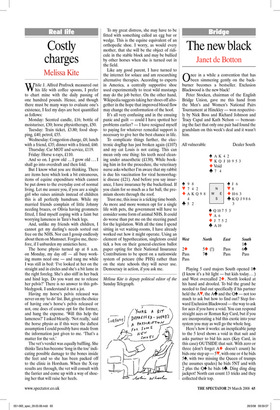Costly charges
Melissa Kite
While J. Alfred Prufrock measured out his life with coffee spoons, I prefer to chart mine with the daily passing of one hundred pounds. Hence, and though there must be many ways to evaluate one’s existence, I feel my days are best quantified as follows: Monday: Scented candle, £16; bottle of moisturiser, £30; horse physiotherapy, £50.
Tuesday: Train ticket, £3.80; food shopping, £40; petrol, £55.
Wednesday: Congestion charge, £8; lunch with a friend, £35; dinner with a friend, £60. Thursday: Car MOT and service, £119. Friday: Horse x-rays, £110.
And so on. I grow old ... I grow old ... I shall go into overdraft and then fold.
But I know what you are thinking. There are items here which look a bit extraneous, items of equine expenditure which cannot be put down to the everyday cost of normal living. Let me assure you, if you are a single girl who raises animals instead of children this is all perfectly humdrum. While my married friends complain of little Johnny needing braces, or Olivia having grommets fitted, I find myself coping with a faint but worrying lameness in Tara’s back legs.
And, unlike my friends with children, I cannot get my darling’s needs sorted out free on the NHS. Nor can I gossip endlessly about them on Mumsnet. Forgive me, therefore, if I unburden my anxieties here.
The horse physio turned up at 8 a.m. on Monday, my day off — all busy working mums need one — and rang me while I was still in bed: ‘I’ve looked at her on the straight and in circles and she’s a bit lame in the right foreleg. She’s also stiff in her back and hind legs. Do you want me to release her pelvis?’ There is no answer to this gobbledygook. I understand it not a jot.
Having my horse’s pelvis released was never on my ‘to do’ list. But, given the choice of having one’s horse’s pelvis released or not, one does of course opt for the former, and hang the expense. ‘Will this help the lameness?’ I asked blearily. ‘Not really,’ said the horse physio as if this were the daftest assumption I could possibly have made from the information just given to me. ‘That’s a matter for the vet.’ The vet’s verdict was equally baffling. She thinks Tara has become ‘long in the toe’ indicating possible damage to the bones inside the feet and so she has been packed off to the clinic in Horsham. When the X-ray results are through, the vet will consult with the farrier and come up with a way of shoeing her that will raise her heels. To my great distress, she may have to be fitted with something called an egg bar or wedge. This is the equine equivalent of an orthopedic shoe. I worry, as would every mother, that she will be the object of ridicule in the stable block and may be bullied by other horses when she is turned out in the field.
Like any good parent, I have turned to the internet for solace and am researching alternative therapies. According to experts in America, a centrally supportive shoe used experimentally to treat wild mustangs may do the job better. On the other hand, Wikipedia suggests taking her shoes off altogether in the hope that improved blood flow may change the conformation of the hoof.
It’s all very confusing and in the ensuing panic and guilt — could I have spotted her problems earlier? — I have resigned myself to paying for whatever remedial support is necessary to give her the best chance in life.
To complicate things further, the electronic dogflap has just broken again (£107) and my cat Louis is not eating. This can mean only one thing: his teeth need cleaning under anaesthetic (£130). While booking him in for the procedure, the veterinary nurse asks whether I’m aware that my rabbit is due his vaccination for viral hemorrhagic disease (£21). And before you say insurance, I have insurance by the bucketload. If you claim for so much as a fur ball, the premium shoots through the roof.
Trust me, this issue is a ticking time bomb. As more and more women opt for a single life with pets, the government will have to consider some form of animal NHS. It could do worse than put me on the steering panel for the legislation. With all the time I spend sitting in vet waiting-rooms, I have already worked out how it might operate. Using an element of hypothecation, singletons could tick a box on their general-election ballot paper opting for their National Insurance Contributions to be spent on a nationwide system of petcare (the PHS) rather than on the state schools they will never use. Democracy in action, if you ask me.
Melissa Kite is deputy political editor of the Sunday Telegraph.
















































































 Previous page
Previous page